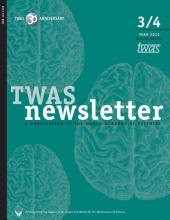Building networks for a new era of science
Pages 2-4: The global culture of science is constantly evolving, but today we are in a period of profound, rapid change. TWAS is changing, too, to maintain and extend its leadership on issues of science and engineering in the developing world.
Bai Chunli: "At 30, I stood firm."
Pages 5-8: In his opening address to the TWAS General Meeting, Academy President Bai Chunli cited the words of Confucius to underscore the significance of the Academy’s 30th anniversary. "We have earned a position of respect in the world of science," he declared. "The global family of science relies on us."
Looking back, moving ahead
Pages 9-10: At the 2013 General Meeting in Buenos Aires, TWAS members celebrated 30 years of accomplishments by the Academy and its members. But there was a strong focus on the future.
The power of global science cooperation
Pages 11-15: Science ministers and top policy leaders meeting in Buenos Aires explored how to advance science education and innovation in a challenging international environment.
TWAS elects 52 new members
Page 16: Fifty-two new members were elected to TWAS during the Academy’s 24th General Meeting, held in Buenos Aires from 1 to 4 October 2013. With those new Fellows, TWAS membership rose to 1,105.
Bringing light into the darkness
Pages 17-19: TWAS-Lenovo prize winner Claudio Bunster Weitzman advanced both theoretical physics and Chilean science.
Honouring the best and brightest
Pages 20-25: TWAS Prizes recognize achievements of scientists from the South.
Sharing a vision of progress
Pages 26-28: Fu Shuqin and Immacolata Pannone received TWAS-UNESCO lifetime achievement honours in Buenos Aires.
Prizes honour work on health, poverty
Pages 29-32: High-impact vaccination programmes. Reactors to purify drinking water. A database that illuminates the causes of poverty. Three highly focused projects carried out by scientists from the developing world won high honours at the TWAS General Meeting.
Beatiful, complex and mysterious
Pages 33-36: Argentinian neuroscientist Francisco Barrantes has spent a career bringing the finest details of the nervous system into sharp focus. Advanced technology provides new insights, he says, but many mysteries remain.
Leaving home, and going back again
Pages 37-40: It's important for young scientists to work overseas, says influential Brazilian physicist Luiz Davidovich. And it's important that they return home to strengthen their nations and their people.
Science definitely is not boring
Pages 41-43: Diego Golombek, one of Latin America's most influential science communicators, has a message for researchers everywhere: Abandon jargon, embrace enthusiasm – and please, no more potted plants.
The human face of TWAS in Africa
Pages 44-48: In a new documentary, Seeds of Science, Italian filmmaker Nicole Leghissa explores how researchers in Kenya are transforming farms, laboratories, communities – and people's lives.
Sand, cancer and the power of innovation
Pages 49-51: From China and South Africa, two women scientists devise new strategies to solve problems and make a difference in their countries.
Bringing global science to life
Pages 52-53: At the annual TriesteNext science festival, TWAS joined with other local science centres on a photographic exhibition that spanned the world of scientists at work.
People, Places, Events
Pages 54-55: Brief news about honours, appointments, awards and events.

